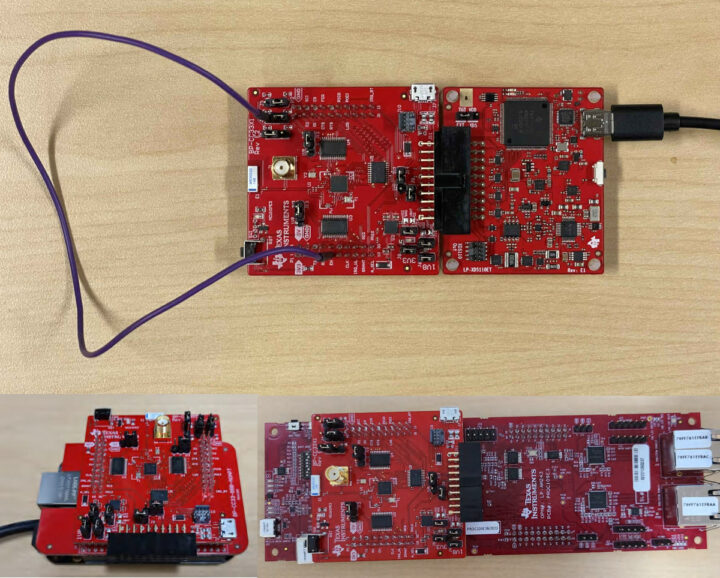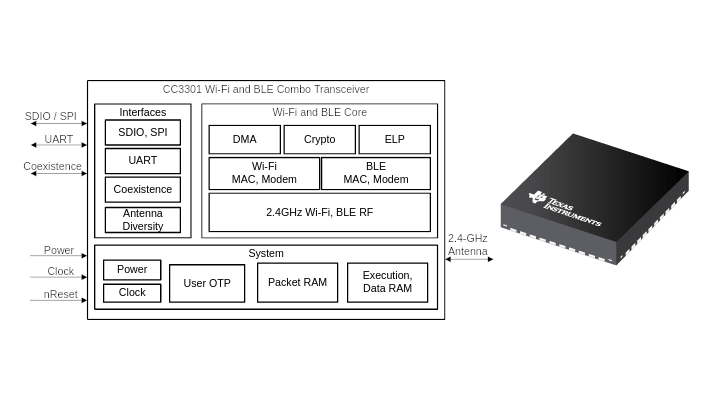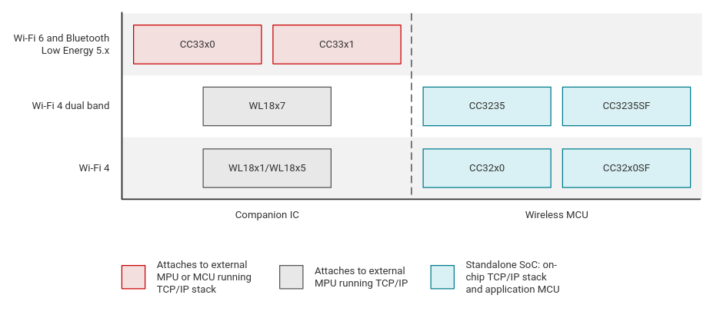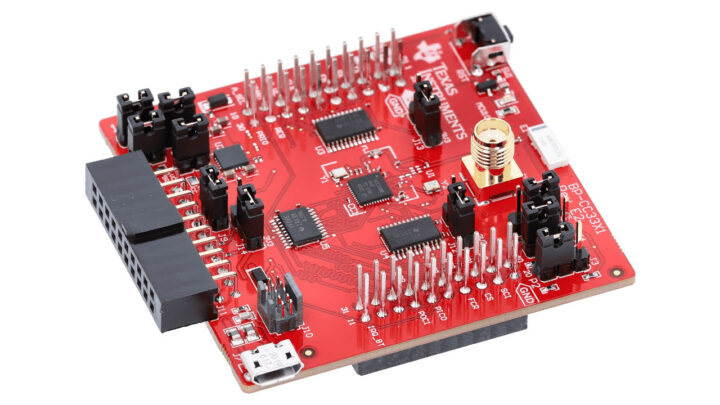Texas Instruments has unveiled the SimpleLink CC33xx family of Wi-Fi 6 companion IC with optional Bluetooth 5.3 Low Energy designed to be connected to a microcontroller (MCU) or a microprocessor (MPU) for secure and power-efficient IoT devices,
The SimpleLink CC3000 supports 2.4 GHz WiFi 6, and interfaces over SDIO, SPI, and/or UART to the host system, while the SimpleLink CC3301 also adds support for Bluetooth 5.3 LE. Both chips can operate in high-temperature environments up to 105ºC.
Texas Instruments CC3300/CC3301 specifications:
- Wireless
- 2.4 GHz WiFi 6 (802.11ax) up to 50 Mbps; Support for TWT and OFDMA, multirole (Access Point and Station)
- CC3301 only – Bluetooth 5.3 Low Energy up to 2 Mbps
- WiFi and Bluetooth COEX
- Host interface – 4-bit SDIO or SPI, and UART to external MCU or MPU
- Security – FW authentication and anti-rollback protection, WPA2/WPA3, Secured host interface
- Pacakge – 40-pin QFN package (5×5 mm)
- Temperature range – -40 to 105°C
The C33xx are the first SimpleLink chips to support WiFi 6 (and Bluetooth Low Energy 5.x), with Texas Instruments having yet to offer a standalone SoC supporting both. Instead, the CC3300 and CC3301 are designed to be connected to an MPU running Linux such as the AM62A Arm Cortex-A53 vision processors to design a WiFi 6 AI security camera, or microcontrollers such as CC2652R7 SimpleLink multiprotocol wireless MCU or an AM243x Cortex-R5F MCU to create multi-protocol solutions with Wi-Fi 6, Bluetooth LE 5.3, Thread, Zigbee 3.0 and Matter protocols.
Target applications include grid infrastructure (e.g. electricity meter), building & home automation, smart home appliances, medical equipment such as infusion pumps or ultrasound scanners, and retail automation/payment systems.
Texas Instruments has designed the BP-CC3301 evaluation board / BoosterPack plug-in module based on the SimpleLink CC3301 Wi-Fi 6 and Bluetooth Low Energy companion chip which can be connected to TI LaunchPad development kits, BeagleBone Black SBC through an adapter, or to a PC for RF testing using LP-XDS110 Debug Probe.
There’s limited public information about software/firmware development as the “full data sheet, software, and other information” are only available upon request. The code would be running on the host MCU/MPU, but I could not see any driver. The company links to Code Composer Studio on the product page so it might already be supported there in TI devkits. RF testing with your PC requires the “Simplelink Wi-Fi Toolbox” software, also only available upon request.

Samples of the CC33xx companion ICs are available now, but mass production is only expected for Q4 2023. Pricing for the CC3300 starts at US$1.60 in 1,000-unit quantities, while the BP-CC3301 evaluation board is available now for US$39. Texas Instruments also say they are developing pin-to-pin compatible dual-band Wi-Fi 6 devices that will be sampling later this year. More details can be found on the product page and the press release.
Thanks to TLS for the tip.

Jean-Luc started CNX Software in 2010 as a part-time endeavor, before quitting his job as a software engineering manager, and starting to write daily news, and reviews full time later in 2011.
Support CNX Software! Donate via cryptocurrencies, become a Patron on Patreon, or purchase goods on Amazon or Aliexpress







